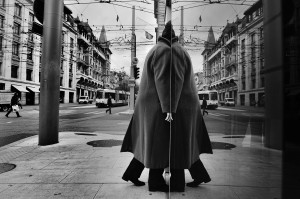Record noir of the gray, secret world of the Swiss banking industry

A client goes to use a cash machine in the glass-walled BNP Paribas bank office building on Rue de la Corraterie, in Geneva’s banking district. Photo Mark Henley
Mark Henley’s photos of Swiss banks and the air of discreet privilege and dodgy dealings that hangs over the $7-trillion secret have just got to be seen.
Click here to go to the Bloomberg photo essay. It’s got evocative black and white photos possible of the gray area that is Switzerland’s massive banking sector, which holds “a third of the world’s offshore assets, including, say critics, the cash of dictators, despots, gangsters, and arms dealers”.
All of this, protected by the country’s strict banking secrecy laws.
Mr Henley’s shots were taken in Geneva’s banking district, mostly around the headquarters of the two big banks, UBS and Credit Suisse on the Paradeplatz. The camera watches a chauffeur-driven limo convey a bank client to their destination; picks up the riveting mirror image (top left) produced when a man uses a cash machine in the glass-walled BNP Paribas bank office building on the Rue de la Corraterie. It attends bank AGMs, shareholder meetings and plush dinners.
The noir record conveys the sense of peering into a closed world, stealing a quick look at something you would never expect to see. The accompanying article says that UBS and Credit Suisses’s vast vaults beneath Paradeplatz contain “gold, cash, and enough secrets to feed a myriad of spy novels and thrillers.”
The photos come at a time of great change. The Swiss are a great deal less sanguine about their banking industry. Everyone, including bank shareholders, are “disenchanted with the apparent arrogance, incompetence, and venality exposed by huge losses, scandals, and galling bonus payments at the banks,” writes Bloomberg. The UBS CEO resigned in 2011 after a rogue trader in London lost more than $2 billion. Last year, Credit Suisse pleaded guilty to helping Americans evade taxes and agreed to pay $2.6 billion. And small private banks aren’t letting their staff travel to the US for fear of arrest.
It’s a shameful pass for an industry that was once a source of national pride.
Mark Henley’s photographs twitches the curtain a bit to allow a look-in.

